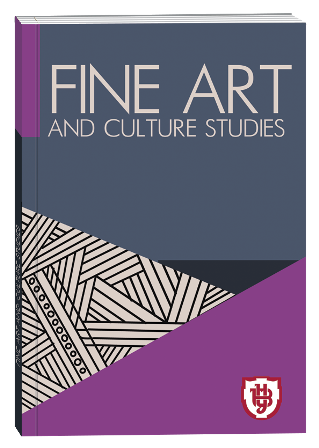A LEADER AND AN AMATEUR MUSICAL GROUP: PSYCHOLOGICAL FOUNDATIONS OF CREATIVE INTERACTION (IN THE PROJECTION ON THE ACTIVITY BY ANATOLII PASHKEVYCH)
DOI:
https://doi.org/10.32782/facs-2024-5-14Keywords:
Anatolii Pashkevych, Volyn Folk Choir, Ukrainian national cultural tradition, psychological interaction, director, collectiveAbstract
One of the examples of selfless service to Ukrainian culture in the post-Soviet era of the second half of the twentieth century is the life work of Anatolii Pashkevych, the director of the Cherkasy (1963–1978), Volyn (1978–1989) and Chernihiv (1989–2005) folk choirs, which declared themselves as successful concert units and, at the same time, carriers of the national tradition. Therefore, the artist’s activity in terms of the psychological foundations of creative interaction between a director and an amateur musical group is a relevant and important topic of contemporary art history, since its study will enable young directors to draw on the experience described and continue the preservation of folk singing. The purpose of the article is to substantiate the psychological foundations of creative interaction between a director and an amateur musical group on the example of Anatolii Pashkevych’s activity. Scientific novelty. The article substantiates the psychological foundations of creative interaction of Anatolii Pashkevych as a leader of an amateur musical group on the example of the Volyn Folk Choir. Conclusion. The analysis of the psychological foundations of creative interaction between a leader and an amateur musical group on the example of Anatolii Pashkevych’s activity has shown effective results of using different types of this interaction depending on the psychological situation, in this case, ‘leader’ and ‘partner’, which is combined with the active involvement of all group members in the process of co-creation. The main personality in this interaction is the leader, who has a priority in building relationships, and his charisma and empathy with the choir members are the key to success both for the organisation of the choir’s work and for artistic interpretations. The artist had an impeccable sense of the situation, the ethics of relationships, and was able to organise the creative process in such a way that each performer perceived his volitional initiative as his own, understood and wanted to co-create in the collective that he created with his own efforts from the folk talents of the Volyn region. As an example of a Dionysian type of creator, the director of the Volyn Folk Choir had a wide palette and high dynamics of feelings, which was manifested not only in the process of creating an artistic whole, but also in the organisational sense – in cooperation with artists, interest and involvement of talented people in the team, active mentoring, etc. All of this had a positive impact on the creation and further life of the choir. Anatolii Pashkevych was a passionate personality of an organiser, composer, and leader who, by his example of serving the national culture, ‘lit up’ others, setting an example for succession – the study of these processes is a promising topic in Ukrainian musical psychology and local history.
References
Андрійчук П. Анатолій Пашкевич як явище в українській пісенній творчості. Народна творчість та етнографія. 2005. № 4. С. 63–66.
Бенч-Шокало О. Український хоровий спів. Актуалізація звичаєвої традиції. Київ : Редакція журналу «Український Світ», 2002. 440 с.
Волинський народний хор. Волинська обласна філармонія : офіційний сайт. URL : https://www.volynconcert.net/index.php/tvorchij-sklad/307-volinskij-narodnij-khor (05.10.2024).
Катрич О. Поняття музично-виконавського архетипу (до питання класифікації музично-виконавських стильових явищ). Київське музикознавство. Київ, 1999. Вип. 2. С. 124–129.
Кашаюк В., Мойсіюк В. Теорія Вчинку В. Роменця та українська хорова школа: психологія, політика, виховне значення. The 40th International scientific and practical conference «Priority Areas of Science Innovations During Martial Law» (November 7–8, 2022). Primedia E-launch LLC, USA, Washington. 2022. С. 67‒70. URL : https://evnuir.vnu.edu.ua/handle/123456789/21459 (15.09.2024).
Кирей В. Пісня «Степом, степом» народилася за одну ніч. Урядовий курʼєр. 2013. № 28. 12 лютого. С. 11.
Костенко В. Анатолій Пашкевич. Київ : Фенікс, 2016. 336 с.
Маланюк Є. Посланіє. Літературнонауковий вістник. 1926. Річник 25, т. 91, кн.12. С. 289‒302. URL : https://elib.nlu.org.ua/object.html?id=8386 (05.10.2024).
Орбан-Лембрик Л. Соціальна психологія. Київ : Академвидав, 2003. 448 с.
Рожок В. Творчість Стефана Турчака в контексті музично-театральної культури України 60 − 80-х рр. ХХ століття : автореферат дис. ... д‑ра мистецтвознав. : 17.00.03. Київ, 1997. 47 с.
Роменець В. Психологія творчості. Київ : Либідь, 2004. 288 с.
Струцюк Й. «Вище голову, Маестро!» (До 60-річчя композитора). Віче. 1998. 5 лютого.
Bowne B. P. Personalism. Houghton : Mifflin & Co, 1908. 354 s. URL : https://archive.org/details/personalism00bownuoft (03.10.2024).
Gustav Mahler: Memories and Letters / Ed. Donald Mitchell. New York : The Viking Press, 1969. 369 pp.
Mounier E. Manifeste au service du personnalisme. Paris : Fernand Aubier, Editions Montaigne, 1936. 242 рр.
Weingartner F. On conducting / Tr. by E. Newman. London : Breitkopf & Härtel, 1906. 63 p. URL : https://edisciplinas.usp.br/pluginfile.php/7576870/mod_resource/content/1/Felix%20Weingartner%20-%20On%20Conducting.pdf (25.09.2024).







